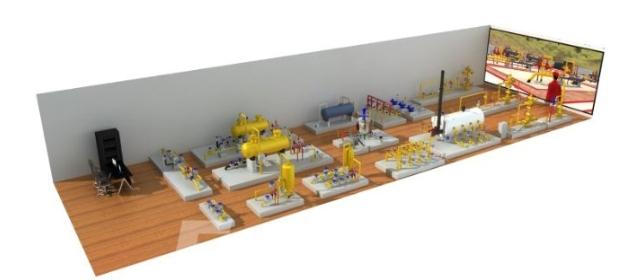Notifications

3 minutes, 9 seconds
-12 Views 0 Comments 0 Likes 0 Reviews

The oil and gas industry is undergoing a digital transformation, with Artificial Intelligence (AI) and Machine Learning (ML) playing a pivotal role. One of the most impactful applications is in gas production simulation, where AI enhances predictive accuracy, automates decision-making, and optimizes extraction processes. In this blog, we’ll explore how AI-driven simulators are shaping the future of gas production.
1. Faster and More Accurate Predictions
Traditional reservoir simulations rely on physics-based models, which can be time-consuming. AI accelerates this process by:
Analyzing vast datasets (seismic, well logs, production history)
Identifying patterns that human engineers might miss
Generating real-time forecasts with higher accuracy
2. Adaptive Learning for Dynamic Reservoirs
Gas reservoirs change over time due to extraction activities. AI-powered simulators continuously learn from new data, adjusting predictions to reflect:
Shifts in pressure and flow rates
Unexpected geological barriers
Equipment performance degradation
3. Automated Optimization of Extraction Strategies
AI can test thousands of extraction scenarios in minutes, recommending the best approach based on:
Maximum production output
Lowest operational costs
Minimal environmental impact
For example, reinforcement learning algorithms can optimize well placement and fracking parameters without human intervention.
4. Predictive Maintenance for Gas Wells
AI-driven simulators integrate with IoT sensors to monitor well conditions. They predict equipment failures before they happen, reducing downtime and maintenance costs.
BP’s Cognitive Reservoir Modeling – Uses AI to simulate reservoirs and improve recovery rates.
Schlumberger’s DELFI Simulator – Leverages machine learning to optimize gas field development.
Saudi Aramco’s AI Reservoir Management – Reduces uncertainty in production forecasts.
Challenges and Future Trends
While AI offers immense benefits, challenges remain:
Data Quality – AI models require clean, high-quality data.
Interpretability – Engineers must trust AI recommendations.
Integration with Legacy Systems – Many companies still use older software.
Future advancements may include:
Digital Twins – Real-time virtual replicas of gas fields.
Quantum Computing – Solving complex simulations in seconds.
Autonomous Gas Fields – Fully automated extraction systems.
AI and machine learning are transforming gas production simulation, making it faster, smarter, and more efficient. As these technologies evolve, they will unlock new levels of productivity and sustainability in the natural gas industry. Companies that embrace AI-driven simulations today will lead the energy sector tomorrow.

